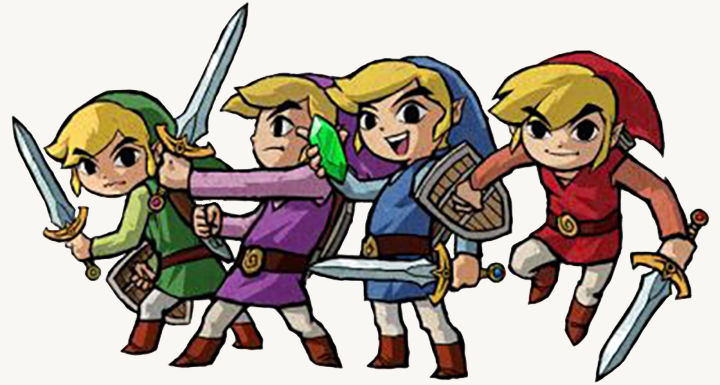“If Your Friend Jumped Into a Bottomless Pit, Would You?” — A Four Swords Anniversary Perspective on Togetherness
Posted on March 22 2024 by Kora Burton

The Legend of Zelda’s 25th Anniversary in 2011 was an exciting time to be a Zelda fan. If you were fully aware of all the great things Nintendo had on offer from 2011 to 2012, this period in Zelda history is probably a strongly nostalgic time for you. I was in my mid-teens, and was primarily focused on Skyward Sword. I was also completely obsessed with the 25th Anniversary Special Orchestra CD that came with the newest series title, even though at the time I hadn’t had personal experience with some of the games the CD featured (yet!). Flying well under my radar as someone who didn’t have a DS, though, was the Ocarina of Time 3D remake, the 3DS Ambassador Program re-releases, and, most importantly given this week’s theme, the DSiWare Four Swords remaster, Four Swords Anniversary Edition.
The fact that I missed out on Four Swords when I was younger is a real shame, too, because clearly something about the first multiplayer Zelda has been a missing part of my brain development as a series fan. The wild abandon, the bright colors, the art style, and the way just casually goofing off with friends while playing it offers glimpses into different aspects of Zelda history and lore – it’s all just so good. I can imagine that sitting around with several friends and chipping away at the game an afternoon at a time in my more formative years would have made for some timeless bonding and memories.

A few years ago, before my Zelda Dungeon days, I published what I would say now was a rather flowery chapter in an essay collection on fan convention appreciation (I had just learned what creative memoir writing was, and it definitely showed). In it, I wrote about fandom imposter syndrome, fighting back against exclusion, and my personal journey attempting to connect to fandom involvement. This discussion culminated in narrating my first fan convention experience, where I wore my first cosplay: Link in Princess Zelda colors inspired by Ocarina of Time and Twilight Princess. It was awesome, but I also wrote about the terrible envy of watching others grow up with and excel at games, while for many years I had been seen by my peers as too slow or outside the “in-crowd” to join in.
Now, looking back with the ZD team on Four Swords‘ history, especially as it surrounds the Anniversary Edition I got to play within the last year, I feel I’ve been given a fun perspective from which to respond to my past self. It’s absolutely true that fandom exclusion can be pretty intimidating to push back against, especially when others use skill or difficulty level, or even your age or previous access to games and media, against you. But I’ve been coming to find that there’s a real power in making sure that same exclusion doesn’t come from within as well — and once you remove this obstacle, you might find just the right inclusive communities you’ve been looking for since the start.
When I decided to go to last year’s Zelda Dungeon Marathon, I wasn’t sure what to expect. I’d anticipated that I’d be interacting with lots of people, mostly new. I knew I’d be playing Zelda games, some familiar and some less so. I feared I would probably embarrass myself, because I don’t see myself as particularly skilled or competitive, and wondered if I’d be able to handle it. Typically, my idea of a fun time gaming is settling into a corner and playing at a slow pace, with no one to watch me make a mistake. But here I was, playing live for an online audience, on purpose. Yikes! Not only that, but the first few games I was set to take part in, including Four Swords Anniversary, I’d never even played before.
Almost immediately after being handed a DS and picking the Blue Link, however, I realized that only a game like Four Swords could have simultaneously realized my fears and made them totally inconsequential. There’s nothing like a group of four people compulsively throwing each other unceremoniously off platforms or tossing pots onto each other’s heads to dispel this notion that, at its core, playing games is about anything other than having a good time. I was still nervous, and I still made mistakes, but then I’d quickly forget because Katie from the ZD social media team would yell, “My cwoissant!” when she lost a boomerang, or wiki, site, and Discord admin Charitwo would try to toss me back into the endless field of springboards we had all just labored to get through, while managing to throw himself back in as well in the process. Delays, setbacks, and the loss of precious Rupees, while sometimes stressful, were the acceptable cost of a chaotic time. I especially loved how the level around your Link would go black if someone threw a pot on your head, and how we would try to recover by looking at someone else’s gameplay on the livestream screen.
Zelda has never really been a multiplayer experience for me, but I’d happily jump back into Four Swords any day. Given the competitive cooperation required to get all four Links through each stage, along with the player’s use of Zelda puzzle knowledge and item familiarity, Four Swords really makes you feel like you can play confidently if you’ve played other Zelda titles before, even if you’d never touched this particular game (as I hadn’t before the marathon!).
Looking back on those short couple of hours playing alongside Katie, Charitwo, and ZD YouTube, social media, and wiki team member McKenna, my time playing Four Swords Anniversary also underscored the togetherness you can feel when putting yourself in the hands of your teammates. We talked through strategy along the way and senior editor Sean kindly supplied coffee and breakfast. At one point, we even hit Rupee Fever, which is activated by all players having full hearts and doubles the value of any Rupee you pick up; ZD editor-in-chief Rod, however, increasingly lost his sanity the longer the Rupee Fever jingle played, echoing wildly as it was between four DS systems. Despite its benefits, I think we were all glad when someone took damage, and the incessant jingle was over. The success and the suffering was shared by everyone. While I had feared the consequences of seeking further inclusion in my fandom community of choice at the outset, I was very happy to end up leaving that play session with good memories and stronger connections than before.
Trying to make yourself a space in the fandom you love can feel risky, especially if you’re a relative latecomer, and I think I will always feel that sense of fandom imposter syndrome, even if, as it is in many other areas of life, it’s ultimately a meaningless distraction. It’s games like Four Swords and my experience with the Anniversary Edition that help highlight the absurdity of counting yourself out before the game even starts. Years after publishing that essay on fandom inclusion, in which I lamented the feelings of often being left out of the gaming and nerd spheres during my childhood and how these experiences changed my outlook, I’ve firmly cemented myself in the Zelda fandom as a member of the Zelda Dungeon team, in a more visible way that I ever thought I would be. On the stream that day playing Four Swords Anniversary, I happened to wear the purple and white Link hat with the Triforce on the front that I had worn with my first cosplay those years ago, when I decided to lean in to being a fan. I’m glad now that I’ve continued to choose inclusion, not just for others, but for myself as well.
What’s been your experience playing Four Swords with friends, particularly Four Swords Anniversary (if you’ve gotten the chance to play it)? Has Zelda been a breakthrough in fandom inclusion for you like it was for me? Does the Rupee Fever jingle make you squeal in delight or writhe in agony? Let me know down below!
Special thanks to Twitch user air272 for contributing the perfectly-timed quip featured in this article’s title during the 2023 Zelda Dungeon Marathon.

Location: Athens, Georgia, USA
Favorite Zeldas: Wild Era, Twilight Princess, Ocarina of Time
Date Joined: 2022
“Tell me… Do you ever feel a strange sadness as dusk falls?”



